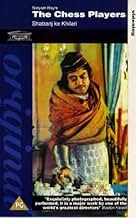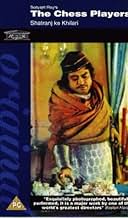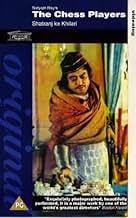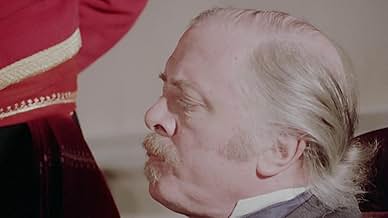Wazed Ali Shah era il sovrano di uno degli ultimi regni indipendenti dell'India. Gli inglesi tramavano un piano per un'annessione. Intanto i nobili Mir e Mirza trascorrevano le loro giornate... Leggi tuttoWazed Ali Shah era il sovrano di uno degli ultimi regni indipendenti dell'India. Gli inglesi tramavano un piano per un'annessione. Intanto i nobili Mir e Mirza trascorrevano le loro giornate giocando interminabili partite a scacchi.Wazed Ali Shah era il sovrano di uno degli ultimi regni indipendenti dell'India. Gli inglesi tramavano un piano per un'annessione. Intanto i nobili Mir e Mirza trascorrevano le loro giornate giocando interminabili partite a scacchi.
- Regia
- Sceneggiatura
- Star
- Premi
- 4 vittorie e 3 candidature totali
- Prime Minister
- (as Victor Bannerji)
- Aqueel
- (as Farooque Shaikh)
- Abbajani
- (as Budho Advani)
Recensioni in evidenza
He showed us his mastery in costumes, their colors, landscape and above all the tempo and dialogs. Especially the one to one talks of Mir and Mirza are great (all are in Proper Urdu which is common in that era). From lighting (the sunsets in the end) to capturing the true emotions (the way he showed the desperation of two wives) is remarkable. Setting of the movie from the very first scene to the end is just amazing in a sense how he tackles different issues to recreate that era.
Acting is pretty good from Mir and Mirza. Rest is just doing their part well.
The film contains two narratives. One narrative focuses on the political machinations of the bullish, pragmatic representative of the British, General Outram, played capably by Richard Attenborough, and the diffident response of the cultured but cloud-headed Indian Muslim King of Oudh, played with great feeling by Amjad Khan.
The other narrative shifts focus to the tragi-comic situation of two well-born Indian Muslim gentlemen, played by the always-wonderful Saeed Jafarey and Sanjeev Kumar, and their obsession with a game of chess, leading them to neglect the momentous tide of history which is about to sweep over them. Indeed, not only is chess a metaphor for the power struggle between Indian and British, but the two chess players' family situations are too, with both men locked into domestic struggles with their wives, the haughty, beautiful Khurshid, played with characteristic commitment by Shabana Azmi and the lascivious, lying Nafisa, well-played by Farida Jalal.
The twin approach is useful and well integrated, and there is even some humorous animation. Ray brings his characteristic eye for ravishing beauty, balanced with his close, sympathetic interest in humanity, particularly when under pressure, and a real feeling for the period. Also typical is the universality of the director's humanitarian outlook, with the nominally Hindu Ray studying Muslims and the British with the same warm but clear-eyed assiduousness.
Overall, this is a film, like all of Ray's films, to treasure, not only for a person of Indian ancestry such as myself.
Based on a short story by Prem Chand, the film is set in Lucknow, India in 1856 and is narrated by the real Amitabh Bachchan. As the film opens, we learn that Oudh's King Wajid Ali Shah (Amjad Khan) has financed the British East India Company for ten years and also provided soldiers for its army. In exchange, the Company did not interfere with Wajid's rule, even though they viewed the king with disdain. This changed in 1856 when General Outram (Richard Attenborough) was instructed to depose the king and take over the kingdom to add to the British coffers. Outram, the local representative of the Company, justifies his ambitions for more territory by denouncing the king to an aide as an incompetent ruler and hedonist, ignoring his devotion to dance, poetry, and music.
In another thread, two Indian aristocrats Mirza (Sanjeev Kumar) and Meer (Saeed Jaffrey) play chess obsessively to the dismay of their wives, Khurshid (Shabana Azmi), and Nafisa (Fardia Jalal). Mirza's wife feeling neglected, steals and hides the chess pieces, while Meer's wife has an affair with his nephew (Farooq Shaikh). Unwilling to handle their domestic affairs, the two first use fruits and vegetables as their set pieces, then seek other places to play their game, refusing to believe that the British takeover is imminent. One of their stops is the home of their attorney who is on his deathbed. This doesn't stop the two from hilariously trying to sneak in a game of chess in another room.
The two players cling to their way of life, exchanging frivolous banter and smoking hookah pipes while the world around them crumbles. They finally take refuge in the home of a young boy, Kullu (Samarth Narain) who remained while others fled just to see the red-coated British soldiers march into the city. While perhaps not in the upper echelon of Ray's work, The Chess Players is a very entertaining political satire that provides wry insight into human nature and our capacity for denial. General Outram is portrayed as a well-meaning but totally condescending individual who utterly fails to understand the lives and culture of the people he seeks to control. Any resemblance to current U.S. Muddle-East policies, of course, is purely accidental.
Lo sapevi?
- QuizSatyajit Ray's only Hindi movie.
- Citazioni
Mir Roshan Ali: Jinse apni biwi-yan nahin sambhli woh angreaz fauz se kya ladenge. Translation : Those whom couldn't even care for their wives, would not be able to fight the British army.
- ConnessioniFeatured in Celluloid Man (2012)
I più visti
- How long is The Chess Players?Powered by Alexa
Dettagli
- Data di uscita
- Paese di origine
- Lingue
- Celebre anche come
- The Chess Players
- Luoghi delle riprese
- Indrapuri Studios, Calcutta, Bengala Occidentale, India(studio: Indrapuri Studios, Calcutta)
- Azienda produttrice
- Vedi altri crediti dell’azienda su IMDbPro
- Tempo di esecuzione2 ore 9 minuti
- Mix di suoni
Contribuisci a questa pagina

































